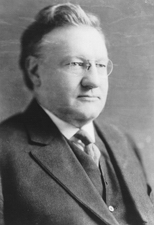James Eli Watson
James Eli Watson (* 2. November 1864 in Winchester , Randolph County , Indiana ; † 29. July 1948 in Washington, DC ) was an American politician of the Republican Party . From 1895 to 1897 and from 1899 to 1909 he sat for the US state of Indiana in the US House of Representatives . From 1916 to 1933 he represented Indiana in the US Senate .
biography
Watson was born in the small town of Winchester, western Indiana. He grew up there with five siblings. His father was a lawyer and also a member of the Republican Party. In 1876 Watson accompanied his father to the Republican National Convention , where he took part as a delegate. Watson studied law at DePauw University . In 1886 he successfully completed his studies. In the same year he was admitted to the bar and practiced from then on in his father's office.
In the 1880s, Watson campaigned for Republican candidates across the state. In 1893 he moved to Rushville . In 1894 he ran successfully in the fourth constituency of Indiana for a seat in the US House of Representatives. In the 1896 election he could not prevail and consequently left the Congress. As early as 1898 he was able to move into the US House of Representatives again, this time in the sixth constituency of Indiana. He was re-elected a total of four times and left Congress again in 1909 to run for governor of Indiana. During his second term in the House of Representatives, he was a close confidante of Joseph Gurney Cannon , the spokesman . Because of his close relationship with Cannon, Watson managed to become a member of the influential Committee on Ways and Means . Likewise, Cannon helped Watson to become Whip the Republican.
In the election to governor of Indiana in 1908, he was defeated by the Democrat Thomas Riley Marshall . From then on, Watson worked as a lawyer in his own law firm in Rushville. Because of his friendship with Cannon, he continued to influence laws and even wrote speeches for Cannon. In 1916 Watson ran for the seat in the US Senate from John W. Kern . There were differences among the Indiana Republicans over some controversial remarks by Watson. You couldn't decide which candidate to officially support. This "problem" then practically resolved itself through the death of Benjamin F. Shively . Watson competed in the election against the appointed Thomas Taggart and was able to prevail. Watson took the oath of office on November 8, 1916 and completed Shively's term of office. Watson was re-elected twice. During his tenure in the Senate, Watson was a Majority Leader and a member of the following committees: United States Senate Select Committee on Woman Suffrage (Chairman 1919-1921), United States Senate Committee on Rules and Administration, and United States Senate Committee on Commerce, Science and Transportation . He was also chairman of the Republican Conference of the United States Senate . In the congressional elections in 1932, he could not assert himself and left the Senate.
Even after he left the Senate, he kept in contact with his party friends in Washington, DC From then on he also worked as a lawyer. In 1948, Watson died in the federal capital at the age of 83. He was buried in Cedar Hill Cemetery in Suitland , Maryland .
Web links
- James Eli Watson in the Biographical Directory of the United States Congress (English)
- James Eli Watson in the database of Find a Grave (English)
| personal data | |
|---|---|
| SURNAME | Watson, James Eli |
| BRIEF DESCRIPTION | American politician (Republican Party) |
| DATE OF BIRTH | November 2, 1864 |
| PLACE OF BIRTH | Winchester , Indiana |
| DATE OF DEATH | July 29, 1948 |
| Place of death | Washington, DC |


